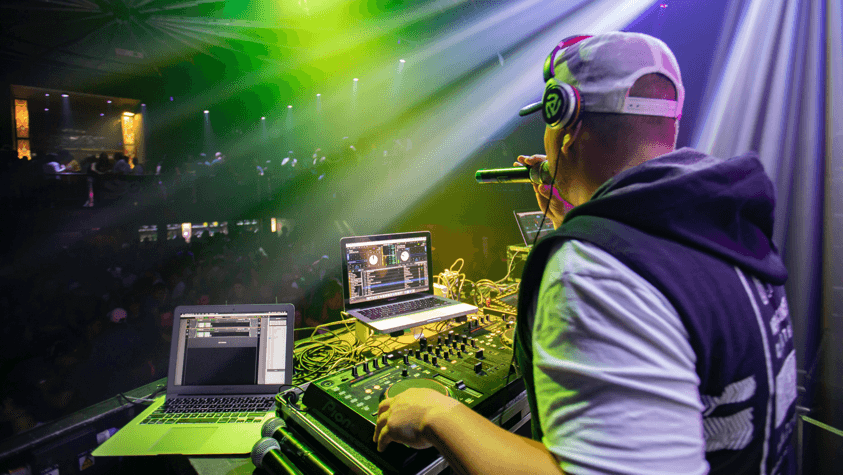By TACP Staff on July 25, 2021

A disc jockey is an on-air voice talent who organizes and oversees radio broadcasting. Known as radio personalities, these artists are responsible for maintaining the flow of a radio show as well as sustaining listener interest. Named after recordings done in disc format, the jockey of today actually rides digital waves and decreasingly determines elements of programming and use of airtime.
Before the popularity of CDs and digital music, music was often recorded onto records, which were flat disc-shaped pieces of vinyl. Because the records were shaped like discs, early music players were called “disc jockeys”.
A disc jockey is often better known by most people as deejays. These are the professionals that choose and play recorded music either for broadcast media or at live events. For instance, deejays are usually responsible for playing the music you here on your morning commute, and they are responsible for the music played in your favorite dance club as well.
Depending on the nature and style of the music, a disc jockey might also alter the sound of the music as well. A “scratch artist” is a good example of one such disc jockey. This type of deejay uses traditional records when playing his chosen music, but he also adds distinctive “scratching” sounds by moving the record on the record player with his hands.
A disc jockey may work alone, or he may work closely with other broadcast or music professionals as well. In fact, it’s not uncommon for a deejay to work alongside another deejay, particularly in radio. A disc jockey might also work with a Master of Ceremonies or radio producers as well.
The job requirements of a disc jockey can vary, depending on what industry he’s in. For the most part, however, nearly all disc jockeys have a few common responsibilities. They are usually in charge of which music to play at a certain time. Although this may seem easy to some, it’s actually quite harder than it looks, especially when trying to please everyone in a large audience.
In order to choose the right type of music, a disc jockey must know his audience. Country music fans, for instance, will usually be quite unhappy if a deejay chooses to play hip hop music for four hours. A deejay should also keep abreast of the ever-changing music trends as well, but he should also have a fair knowledge of past music trends as well; at times, some deejays are called upon to play oldies in addition to popular trendy music. When playing music, most deejays will also take requests from their audience and introduce each song.
A broadcast, or radio, disc jockey, for instance, usually works in a calm, quiet environment, such as a soundproof booth. These types of deejays will sometimes be called upon to perform additional duties, such as reading the news or weather reports on the air.
Working as a deejay in front of a live audience, however, is usually very different. These types of deejays should be very charismatic and willing to interact with the members of their audience. They also usually work in very loud and sometimes uncomfortable environments, such as nightclubs and private events. Most event disc jockeys are also responsible for providing and transporting their own equipment and music selection as well.
Disc jockeys work at all times of the day and night. Some of the most popular times for radio disc jockeys to work are during morning and afternoon commutes and late nights. Club disc jockeys, on the other hand, typically work late nights, and event disc jockeys work around other people’s schedules.
A few successful disc jockeys may have had no formal training, and formal training is not always required to pursue this profession. In some cases, for instance, a good speaking voice, great personality, and extensive knowledge of music are the only requirements for becoming a deejay.
To help ensure a successful disc jockey career, however, proper schooling and training is usually recommended, but not required. In general, those interested in disc jockey careers should consider earning degrees in communications. Aspiring radio deejay should consider degrees in broadcast technology or broadcast journalism.
Since disc jockeys need to have pleasant voices and sometimes speak for long periods of time, voice lessons might also be helpful for anyone considering a disc jockey career as well.
A few successful disc jockeys may have had no formal training, and formal training is not always required to pursue this profession. In some cases, for instance, a good speaking voice, great personality, and extensive knowledge of music are the only requirements for becoming a deejay.
To help ensure a successful disc jockey career, however, proper schooling and training is usually recommended, but not required. In general, those interested in disc jockey careers should consider earning degrees in communications. Aspiring radio deejay should consider degrees in broadcast technology or broadcast journalism.
Since disc jockeys need to have pleasant voices and sometimes speak for long periods of time, voice lessons might also be helpful for anyone considering a disc jockey career as well.
A disc jockey can work in a few different settings, depending on his preferences. Radio stations, for instance, often hire disc jockeys to speak and play music on the air. Most inexperienced radio deejays will usually start their careers in entry-level positions, and work their way up to more lucrative positions. For instance, some radio deejays might start out as fill-ins for full-time deejays, and others might start out working during less desirable time slots. Dance clubs and nightclubs also hire disc jockeys on occasion. Some club deejays work as staff members, while others run their own deejaying business. Besides working at clubs, self-employed deejays will also usually play music at private events as well, such as wedding receptions and school dances.
Consider these related careers in Music and Sound.

The Art Career Project is a trusted resource for emerging and professional artists.